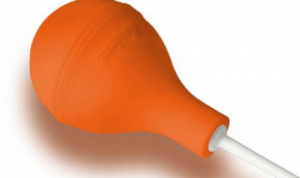Local enema syringe plays role in HIV/AIDS transmission – Dr Sowah
 Dr Roland Sowah, Western Regional HIV/AIDS Coordinator, at the Effia Nkwanta Hospital in Sekondi, has noted that the use of one local enema syringe known locally as bentua by many people, had the potential to transmit HIV/AIDS.
Dr Roland Sowah, Western Regional HIV/AIDS Coordinator, at the Effia Nkwanta Hospital in Sekondi, has noted that the use of one local enema syringe known locally as bentua by many people, had the potential to transmit HIV/AIDS.
He said one HIV/AIDS victim died in Takoradi, thereafter three relatives from the same house also passed away in turns within a short period, and this aroused the curiosity of the HIV/AIDS Unit to conduct investigations into the deaths from the house.
Dr Sowah said the investigations revealed that the entire household was using a common syringe for enema for herbal treatment; therefore the three were tested of the disease which proved positive.
Based on the report, he remarked that “the local syringe used by infected people for enema played a role in the transmission of HIV/AIDS.”
Dr Sowah was a resource person at a two-day “Enhanced HIV/AIDS Training” workshop jointly organized by the American President’s Emergency Plan for Aids Relief (PEPFAR) and the Western Regional branch of the Ghana Journalists Association (GJA) for some journalists in the region in Takoradi.
He noted that some attendants at public toilets were also in the habit of giving enema syringe to people who visit the facility on demand for enema, and called for a halt to the practice, describing it as highly infectious.
Dr Sowah indicated that the manufacturers in their own wisdom fixed the round syringe with the original tube, but some people removed it and replaced with pen tube which they did not sterilize, therefore making it potential to infect others when used by an infected person.
According to the HIV/AIDS Coordinator, the fashionable tiny pants known as (Girdle or G String Jeans) worn by ladies equally had the potential to transmit HIV/AIDS, as it easily transmitted virus from the anus to the female organ through the fluid.
He advised against its use, and said though the prevalence rate of HIV/AIDS in the region had gradually reduced, there was the need to exercise caution and act responsibly, by either having protected sex with condom, being faithful to partners, or abstaining from sex until one was ready to marry.
For people to know their status about the disease, Dr Sowah encouraged Ghanaians to go for tests so that those infected would be on observation, and controlled with anti-retroviral drugs to stop multiplication of the virus.
He said to his knowledge no herb had been proven to cure the disease, and therefore urged people to disabuse their minds that the disease could be cured with herbal concoction.
The HIV/AIDS Coordinator said sex was the major contributory factor to contract the disease, while the minor ones were infected by razors used by victims, mother-to-child transmission and others.
On Sexually Transmitted Diseases (STDs), Dr Sowah indicated that four health facilities at Eikwe, Effia Nkwanta, Sefwi-Asafo and Tarkwa had been designated to monitor the diseases, especially on pregnant mothers for quick response.
He said HIV/AIDS was high in the urban centres than the rural areas, adding that in the cities promiscuity was highly practised in the hotels, harbour areas and the beaches.
Mr David Agbenu, Editor of the Ghanaian Times, and Mr Moses Aklorbortu, Chairman of the Region’s GJA, called on the media to report more on the dreadful HIV/AIDS in order to create the awareness of its continued existence for people to behave responsibly to prevent the spread.
Mr Agbenu was not happy that there had been silence on the issue, and said the GJA would consider awarding packages to journalists who reported more on the disease.
Mr Philip Baidoo, Western Regional Manager of the Ghana Broadcasting Corporation (GBC), said the corporation had requested for the payment of television license to enable it run more educational and topical issues like the HIV/AIDS, to intensify awareness creation of its existence
Madam Dzid Enyoman Kwame, Media Specialist of the PEPFAR at the American Embassy, said America, realizing that the HIV/AIDS had not been eradicated from the system had partnered Ghana to fight it, hence its sponsorship for the workshop.
Dr Sowah later led the participants on a tour of the facilities used to treat the HIV/AIDS victims at the Effia Nkwanta Hospital.
Source: GNA
